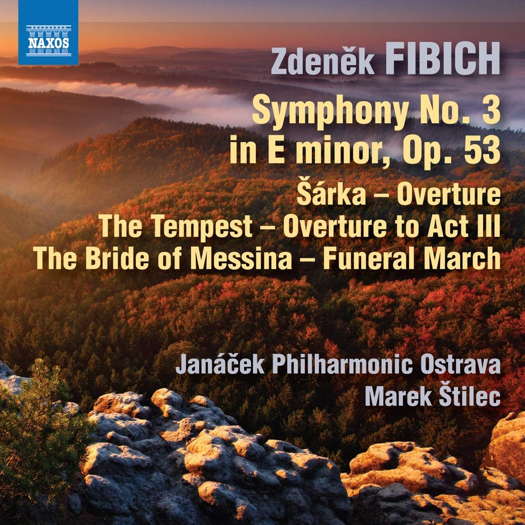ARTICLES BEING VIEWED NOW:
- Régine Crespin
- Hector Berlioz
- Ruth Railton
- Marián Varga
- Profile. A Very Positive Conductor - Paul Bodine talks to Los Angeles Opera's Music Director Designate, Domingo Hindoyan

Excellent Music Overshadowed
GEOFF PEARCE has a first encounter with the music of Zdeněk Fibich
'The Janáček Philharmonic Ostrava is very fine, and the musicians and conductor Marek Štilec obviously enjoy performing these works.'
I was aware of this late nineteenth century Czech composer Zdeněk Fibich (1850-1900), but I don't believe I have heard any of his music before. Unfortunately, he is one of those composers who wrote excellent music, but was often overshadowed by some of his contemporaries. I think a large part of this was due to the fact that his music generally was more firmly in the Austro-Hungarian tradition (as his country at that time was part of that sprawling empire), than of the emerging nationalistic composers, such as Dvořák and, later, Janáček and Suk.
Listening to the Third Symphony for the first time, I was struck by how well crafted this work is. It starts abruptly with no slow introduction, is tuneful, colourful in its orchestration and somewhat sunny in its disposition, if at times somewhat resolute. At times the work is dramatic and at others beguiling and it amazes me why this composer is not played more often in our concert halls.
Listen — Fibich: Allegro inquieto (Symphony No 3 in E minor)
(track 1, 5:07-5:50) © 2020 Naxos Rights (Europe) Ltd :
The second movement commences with some dramatic full orchestra chords that are interspersed with sweet tunes, firstly by clarinet, then oboe, cor anglais and a lovely lush carpet of strings that take up the ideas introduced by the woodwind. The track is entitled 'Allegro con fuoco' and I was expecting something fast and furious, but the music that unfolded was far from that, being somewhat idyllic in nature, with build ups to climaxes being slow and measured, rather than of the fiery kind.
Listen — Fibich: Allegro con fuoco (Symphony No 3 in E minor)
(track 2, 5:40-6:28) © 2020 Naxos Rights (Europe) Ltd :
The third movement (Scherzo and Trio) is a delight. The opening, with upper wind and strings is playful and coquettish to begin with and then becomes full of exuberance, before the playful section resumes. This movement appeals to me very much. This leads to a slower and thoughtful trio section. There is some beautiful writing, both for the strings, but also for the horns and woodwind. As expected, the first theme returns pretty much as with the opening, and it ends quietly.
Listen — Fibich: Vivo e grazioso (Symphony No 3 in E minor)
(track 3, 4:57-5:49) © 2020 Naxos Rights (Europe) Ltd :
The final movement is a little darker and considerably more dramatic than the opening movement, but is never gloomy, and any areas of darkness quickly give way to joyous optimism. This is a masterful movement in so many ways, especially in the combination of darker and lighter ideas to emerge as something that is strong and optimistic. In this movement I can hear echoes of the spirit of Smetana, more so than in other movements.
Listen — Fibich: Allegro maestoso (Symphony No 3 in E minor)
(track 4, 6:00-6:40) © 2020 Naxos Rights (Europe) Ltd :
The remaining tracks are drawn from three of Fibich's most important operas.
The first one, the overture to Šárka, a subject dating back to a fourteenth century legend which was the inspiration for Smetana's Ma Vlast and an early opera by Janáček. This overture is dark right from the beginning and retains a tragic character throughout. It is a direct contrast to the symphony and reveals that the composer can write darker and more dramatic music when the subject required it. In the centre of the overture there is a lovely interlude, first played on cor anglais, but later taken up by flutes, clarinets,horns and oboe before the darkness resumes.
Listen — Fibich: Šárka Overture
(track 5, 4:35-5:19) © 2020 Naxos Rights (Europe) Ltd :
The overture to Act III of Bouře (The Tempest) is inspired by Shakespeare's play and is a delightful, charming piece, beautifully orchestrated. There are moments of contrast when the mood takes on a slightly darker hue, but these are soon dispelled.
Listen — Fibich: Overture (Bouře Act III)
(track 6, 3:59-4:48) © 2020 Naxos Rights (Europe) Ltd :
The final work here is the funeral music from the third act of the opera Nevěsta messinská (The Bride of Messina) which Fibich produced about ten years earlier. Suitably dark in places, it builds in emotional power and then has a more noble section before the darkness resumes.
Listen — Fibich: Funeral March (Nevěsta messinská Act III)
(track 7, 2:10-3:04) © 2020 Naxos Rights (Europe) Ltd :
I hope that there is a revival of Fibich's music, and that the series of discs that this is the culmination of may help lead to this. The Janáček Philharmonic Ostrava is very fine, and the musicians and conductor Marek Štilec obviously enjoy performing these works. I hope that some appreciation and recognition of this fine composer, whose output is not insubstantial, will flow.
Copyright © 11 November 2020
Geoff Pearce,
Sydney, Australia

CD INFORMATION - FIBICH: SYMPHONY NO 3



